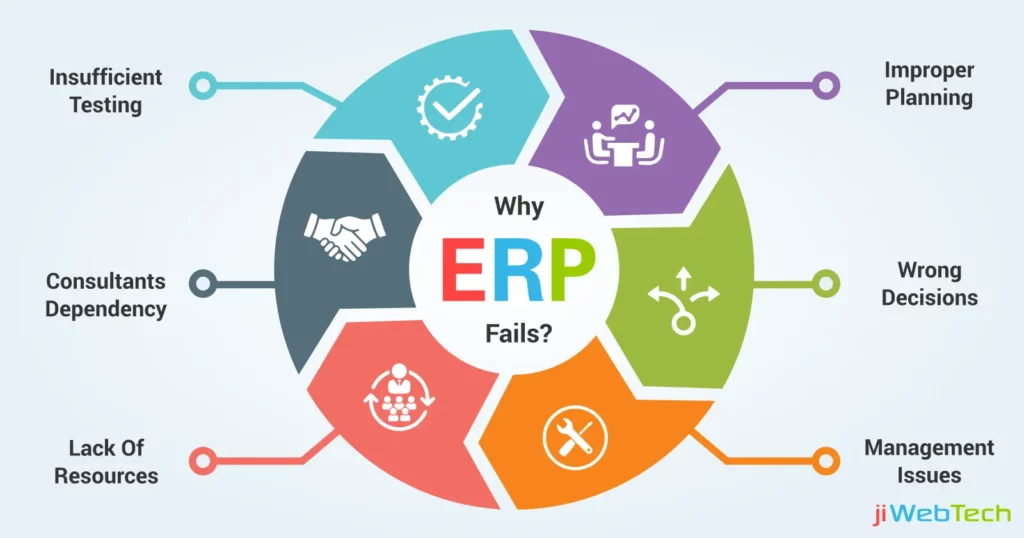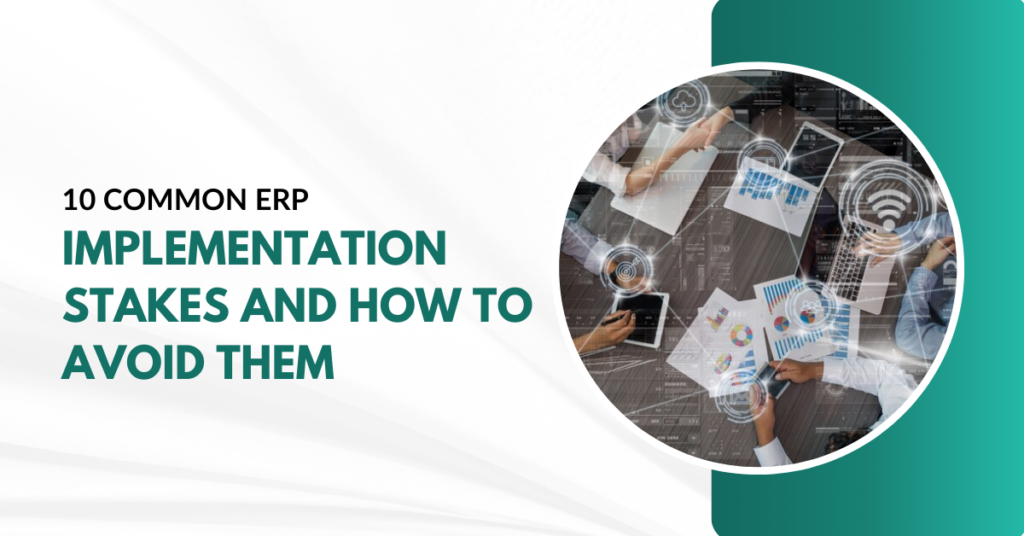ERP systems play a crucial role in improving organizational performance. They are complex software solutions that can bring many benefits to businesses. These include improved efficiency, organized operations, and enhanced decision-making. However, despite their potential benefits, ERP implementations often need help. In this blog post, we will explore ten common ERP implementation mistakes. We will also provide insights on how organizations can avoid them.
Common ERP Implementation Mistakes:
Here is the list of common ERP implementation mistakes that organizations make. We have also provided some solutions to tackle them for business success.
1. Inadequate Planning and Preparation
Mistake:
One of the most common ERP implementation mistakes is insufficient planning and preparation before implementing ERP. This includes an inadequate understanding of organizational needs, goals, and potential challenges.
Solution:
- Conduct a comprehensive assessment of your organization’s requirements and objectives.
- Engage key stakeholders from different departments to gather insights.
- Create a detailed implementation plan before starting the implementation process.
- Ensure that the program includes milestones, timelines, and contingency measures.
2. Lack of Executive Involvement
Mistake:
Successful ERP implementation requires active involvement and support from top-level executives. Without leadership buy-in, the project may lack the necessary resources and direction.
Solution:
- Ensure that executives are engaged from the planning phase to the execution of the ERP project.
- Establish a steering committee with representation from leadership to provide guidance.
3. Insufficient User Training
Mistake:
Neglecting end-user training is a common pitfall. Users may need help to adapt to the new system, leading to inefficiencies and resistance to change.
Solution:
- Develop a comprehensive training program within the organization.
- Provide hands-on training sessions, documentation, and continuous support. This will help users become proficient with the new ERP system.
4. Overlooking Data Migration

Mistake:
Inaccurate or incomplete data migration can lead to data integrity issues. This will affect the success of the ERP implementation.
Solution:
- Invest time and resources in cleaning and validating data before migration.
- Create a data migration plan that includes data mapping and validation processes.
- Test the migrated data to identify and rectify any discrepancies.
5. Scope Creep
Mistake:
Scope creep involves expanding project goals beyond the original plan. It can lead to delays, increased costs, and decreased project success.
Solution:
- Define the project scope at the beginning.
- Establish a change control process to manage any alterations.
- Review and assess proposed changes to ensure they align with the project’s objectives.
6. Unrealistic Expectations
Mistake:
Setting unrealistic expectations can lead to disappointment and dissatisfaction among stakeholders. Unrealistic expectations can be regarding the benefits and timeline of the ERP implementation.
Solution:
Establish realistic expectations by conducting a thorough feasibility study. Highlight the long-term benefits of the ERP system and emphasize the importance of a phased approach to implementation.
7. Inadequate Vendor Evaluation
Mistake:
Choosing the right ERP vendor can result in software aligning differently with organizational needs. This leads to inefficiencies and dissatisfaction.
Solution:
- Conduct a thorough evaluation of potential ERP vendors.
- Consider factors such as functionality, scalability, support services, and reputation.
- Seek references from other organizations that have implemented the same ERP system.
8. Poor Communication
Mistake:
Inadequate communication can lead to misunderstandings, resistance to change, and a lack of awareness about the ERP implementation.
Solution:
- Implement a robust communication plan that involves regular updates to all stakeholders.
- Address concerns, provide progress reports, and celebrate milestones to keep everyone informed.
- Engage them throughout the implementation process.
9. Inadequate Testing
Mistake:
Skipping performing testing phases can result in undetected errors. This will lead to disruptions in business operations.
Solution:
- Develop a comprehensive testing plan.
- Include unit, integration, and user acceptance testing in this test.
- Conduct thorough testing at each implementation stage to identify issues before the system goes live.
10. Neglecting Post-Implementation Support
Mistake:
Failing to provide adequate post-implementation support can result in unresolved issues. It can also cause user dissatisfaction and decrease system effectiveness.
Solution:
Establish a post-implementation support plan. Includes ongoing monitoring, issue resolution, and continuous improvement in this plan. Provide training and resources to support users adapting to the new ERP system.
Conclusion
Avoiding common ERP implementation mistakes requires careful planning, effective communication, and a commitment to ongoing improvement. By avoiding these ERP implementation mistakes, organizations can maximize the benefits of their ERP systems. This will help to achieve long-term success in streamlining business processes.
If you are looking for a vendor to have a successful ERP implementation, contact us.




